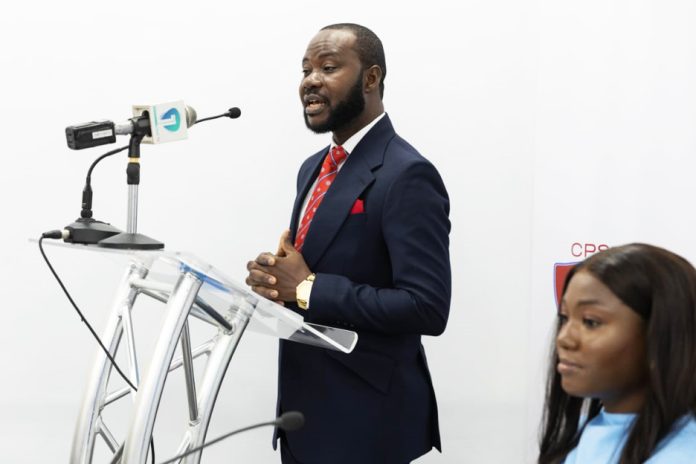The Executive Director of the Centre for Policy Scrutiny (CPS), Dr. Adu Owusu Sarkodie, has urged the government to institutionalize learning from past development strategies to ensure the effective implementation and sustainability of the 24-Hour Economy Programme.
Presenting a detailed review paper on, “Ghana’s 24-Hour Economy and Accelerated Export Development Program”, in Accra on Tuesday, 21, 2025, Dr. Adu Owusu Sarkodie cautioned that Ghana’s history is filled with ambitious programmes that failed due to weak implementation frameworks, poor coordination, and lack of continuity.
“Ghana has embarked on a number of developmental programs before and after independence, factories were set up, but where are they now? Why did they fail? We should have institutional memory and learn from all these past mistakes,” he said.
According to him, learning from past successes and failures is critical if the 24-Hour Economy Programme, launched in July 2025, is to deliver on its promise of driving productivity, industrial growth, and job creation.
“If you learn from your mistakes, you will know how to keep them, and going forward, we will not waste resources,” he emphasised.
The 24-Hour Economy Programme, dubbed “24H+,” is the government’s national agenda for productivity, competitiveness, and industrial transformation.
It seeks to transition Ghana’s economy from exporting raw materials to producing and exporting value-added goods, while reducing dependence on imported finished products. The plan aims to create a diversified, resilient economy through a mix of strategic sector interventions.
Dr. Adu Owusu Sarkodie explained that the policy is built around eight sub-programmes—GROW24 for agriculture, MAKE24 for manufacturing, BUILD24 for construction, SHOW24 for tourism and the creative arts, CONNECT24 for logistics and market efficiency, FACT24 for financing, ASPIRE24 for human capital development, and GO24 for public mobilisation.
These are anchored on three strategic pillars: production transformation, supply chain efficiency, and human capital development.
He noted that if effectively implemented, the programme could generate about 400,000 jobs annually, reaching 5.3 million jobs by 2034, and drive medium-term economic growth of around 6%.
However, while commending the ambition and scope of the plan, Dr. Adu Owusu Sarkodie and his team at CPS highlighted nine critical observations that could undermine its success if not addressed.
First, he said, the programme correctly diagnoses Ghana’s development challenges, particularly the need to move from raw material dependency to value addition.
It also shares similarities with previous initiatives such as the Coordinated Programme of Economic and Social Development Policies (2017–2024), which emphasised agricultural transformation and industrialisation.
Second, he pointed out the cross-cutting nature of the 24-Hour Economy Programme, which touches on multiple sectors and creates interdependence among them.
For example, GROW24 depends on MAKE24 for agro-processing, while MAKE24 relies on GROW24 for raw materials. This interconnectedness, he noted, is “a good design that promotes inclusive and balanced growth.”
Third, the CPS identified the Volta Basin Economic Corridor as the “flagship of the flagship,” a major component of the programme that seeks to transform the Volta region into an industrial and logistics hub to reduce the southward concentration of development.
If well executed, he said, this could position Ghana as “a logistical and agricultural powerhouse within West Africa.”
Nonetheless, Dr. Adu Owusu Sarkodie warned that the success of the programme depends on its institutional clarity and fiscal realism.
He questioned the lack of alignment between the 24-Hour Economy and Ghana’s National Development Planning Commission (NDPC) framework, saying “Programs of this nature should ideally be integrated into the national development plan to ensure coherence, funding, and accountability.”
He further expressed concern about policy overlaps, particularly in the agricultural sector, where existing initiatives like “Feed Ghana” could clash with “Grow24,” leading to duplication and inefficient resource use.
On fiscal sustainability, Dr. Adu Owusu Sarkodie cautioned that the proposed $4 billion cost estimate for the programme was likely underestimated.
“That figure represents only a portion of the real cost,” he said, adding that indirect costs, tax incentives, and foregone revenues must be accounted for to give a full picture.
He also flagged the declining trend in capital expenditure as a potential obstacle. “Between 2015 and 2024, capital expenditure as a ratio of GDP fell to 2.8%, and the programme itself projects 2.7%. With such low public investment, implementation will depend heavily on the private sector,” he noted.
To address these challenges, Dr. Adu Owusu Sarkodie proposed six key recommendations.
He called for the integration of the 24-Hour Economy Programme into Ghana’s medium-term development framework, ensuring NDPC oversight and budgetary alignment.
He also urged the government to publish transparent cost estimates, undertake robust project appraisals, and design targeted tax incentives linked to productivity and employment outcomes rather than shift operations alone.
Additionally, he advised that infrastructure ambitions must match public investment commitments and, above all, Ghana must “institutionalize learning from past development strategies.”
Concluding his presentation, Dr. Adu Owusu Sarkodie stressed that the 24-Hour Economy holds immense potential to transform Ghana’s economic landscape but must be implemented with discipline, realism, and foresight. “We all want a better Ghana for ourselves,” he said.
“This programme can work but only if we learn from the past and get it right this time.”
For more news, join The Chronicle Newspaper channel on WhatsApp: https://whatsapp.com/channel/0029VbBSs55E50UqNPvSOm2z









